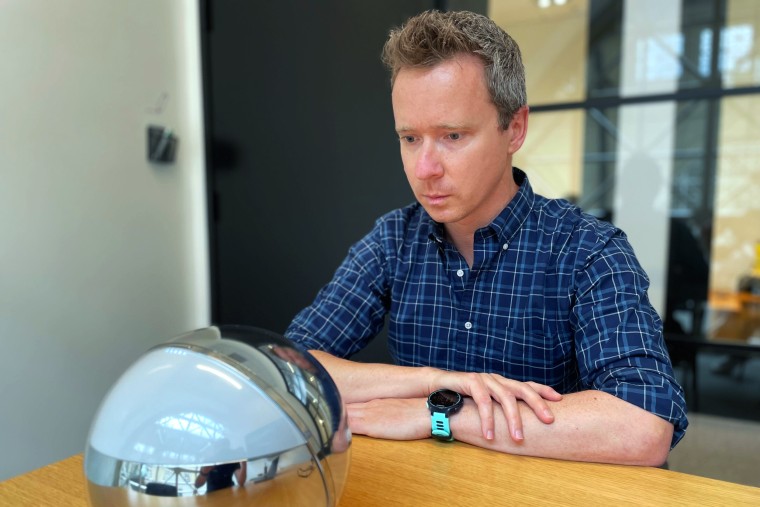Watch CBS News
Be the first to know
Get browser notifications for breaking news, live events, and exclusive reporting.
Watch CBS News
Be the first to know
Get browser notifications for breaking news, live events, and exclusive reporting.
Watch CBS News
Be the first to know
Get browser notifications for breaking news, live events, and exclusive reporting.
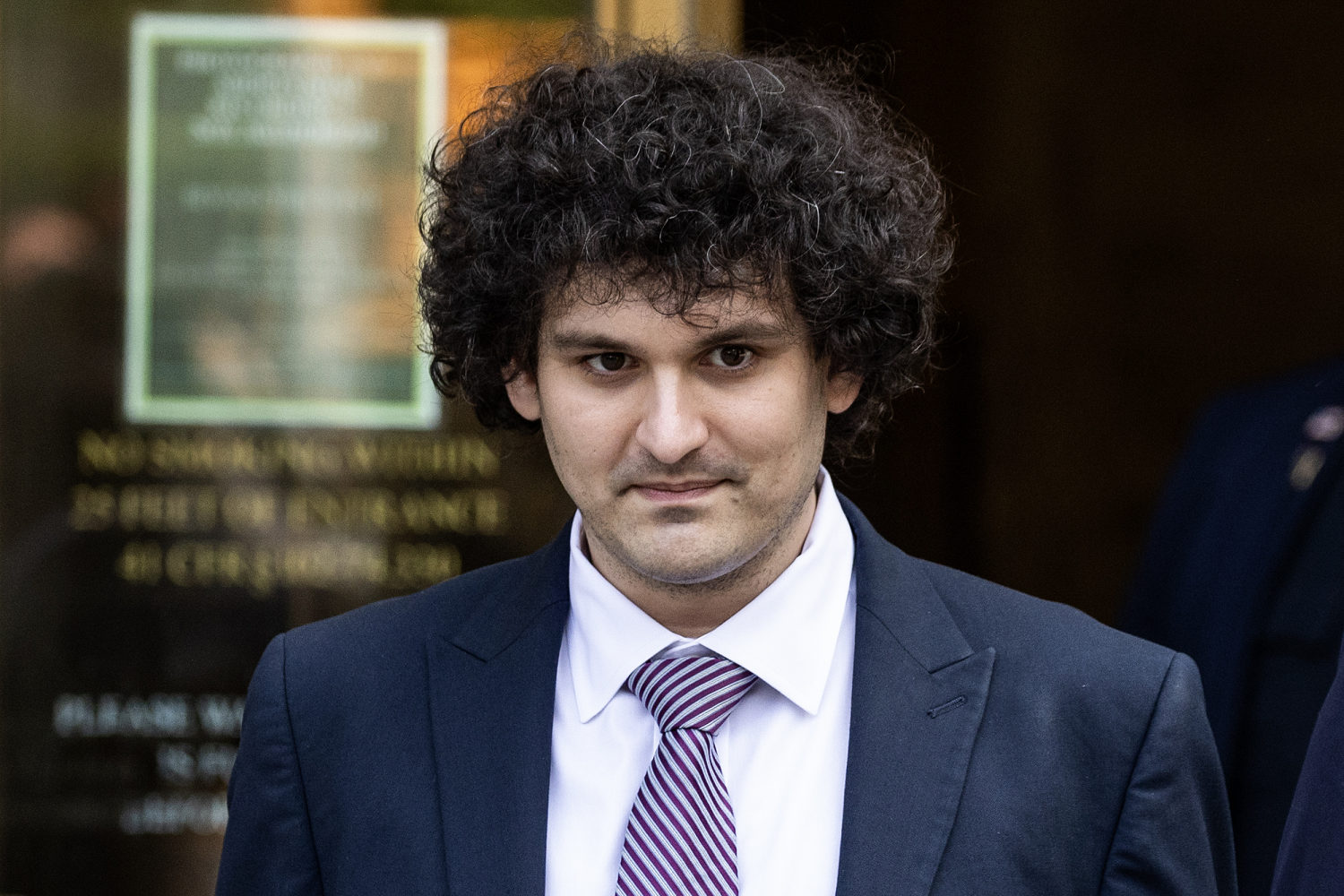
Sam Bankman-Fried was sentenced Thursday to 25 years in prison for his role in defrauding users of the collapsed cryptocurrency exchange FTX.
In a federal courtroom in lower Manhattan, U.S. District Judge Lewis Kaplan called the defense argument misleading, logically flawed and speculative.
He said Bankman-Fried had obstructed justice and tampered with witnesses in mounting his defense — something Kaplan said he weighed in his sentencing decision.
Bankman-Fried, wearing a beige jailhouse jumpsuit, struck an apologetic tone, saying he had made a series of “selfish” decisions while leading FTX and “threw it all away.”
“It haunts me every day,” he said in his statement.
Prosecutors had sought as much as 50 years, while Bankman-Fried’s legal team argued for no more than 6½ years. He was convicted on seven criminal counts in November and had been held at the Metropolitan Detention Center in Brooklyn since.
In a statement following Thursday’s sentencing, Damian Williams, United States Attorney for the Southern District of New York, said Bankman-Fried had orchestrated one of the largest frauds in financial history.
“Today’s sentence will prevent the defendant from ever again committing fraud and is an important message to others who might be tempted to engage in financial crimes that justice will be swift, and the consequences will be severe.”
Bankman-Fried plans to appeal both his conviction and sentence. A spokesperson for his parents issued a statement on their behalf: “We are heartbroken and will continue to fight for our son.”
Bankman-Fried’s lawyers had pleaded for leniency, citing what they described as mental health struggles and his purported generosity in his personal life. They also argued that FTX users had not ultimately suffered substantial losses — something current FTX administrator John Ray said was false in a letter to Kaplan in advance of Thursday’s sentencing.
But prosecutors argued the brazenness of the crime, the extent of the victims’ losses and damages and Bankman-Fried’s evident lack of remorse meant a harsher sentence was warranted.
Late Tuesday, prosecutors filed documents from victims testifying about how Bankman-Fried’s actions had harmed them.
“My whole life has been destroyed,” wrote one, whose name was redacted, in a letter dated March 15. “I have 2 young children, one born right before the collapse. I still remember the weeks following where I would stare blankly into their eyes, completely empty inside knowing their futures have been stolen through no fault of our own. I did not gamble on crypto. I did not make any crypto gains. I had my [bitcoin] which I had collected over years deposited on FTX as a custodian. I did not agree to the risk that SBF took with my funds.”
The man added he was suffering from depression and that his wife had become suicidal.
“I know we can never make that kind of money back ever again,” he wrote.
Another person wrote about how the loss of funds had affected numerous life plans, including a wedding.
“Each passing day is a painful reminder of the opportunities stolen from me, compounding feelings of hopelessness and despair,” the person wrote. “The burden of financial ruin weighs heavily on my shoulders, leading me to grapple with constant thoughts of suicide and significantly impairing my ability to perform at work.”
In the recent annals of white-collar crime, Bankman-Fried’s sentence is many years longer than what most others found guilty have received. Theranos founder Elizabeth Holmes received about 11 years. Former WorldCom CEO Bernie Ebbers received 25 years. Former Enron CEO Jeff Skilling received 24 years.
Bernie Madoff received 150 years and died in prison at age 82.
FTX was once valued at more than $30 billion, with Bankman-Fried’s net worth estimated at more than $20 billion. FTX collapsed in November 2022 after it was revealed that it had a major cash shortfall.
At his trial, prosecutors said Bankman-Fried robbed FTX customers of as much as $8 billion to fund a vast array of outside interests, including political initiatives, speculative investments and funding of FTX executives’ lifestyles.
Three other FTX executives testified against him.
Bankman-Fried “didn’t bargain for his three loyal deputies taking that stand and telling you the truth: that he was the one with the plan, the motive and the greed to raid FTX customer deposits — billions and billions of dollars — to give himself money, power, influence. He thought the rules did not apply to him. He thought that he could get away with it,” Assistant U.S. Attorney Danielle Sassoon told the jury.
Bankman-Fried’s defense argued that he was merely borrowing the funds to run his Alameda Research investment group, which he believed was allowed, and that he was unaware of how much debt he had racked up.
He said he “made a number of small mistakes and a number of larger mistakes.”
Yet many experts agreed Bankman-Fried came across as an unsympathetic figure. Paul Tuchmann, a former federal prosecutor who is now a partner with Wiggin and Dana LLP, told CNBC that Bankman-Fried’s testimony had been “unpersuasive” and noted it took the jury only three hours to convict him on each count.
Trial attorney James Koutoulas said in an CNBC interview, “No one had a shred of support for SBF, nor should they have.”
The U.S. Bureau of Prisons will consider which federal penitentiary to send him to.

Sam Bankman-Fried was sentenced Thursday to 25 years in prison for his role in defrauding users of the collapsed cryptocurrency exchange FTX.
In a Lower Manhattan federal courtroom, U.S. District Judge Lewis Kaplan called the defense’s argument misleading, logically flawed, and speculative.
He said Bankman-Fried had committed obstruction of justice and witness tampering while mounting his defense — something Kaplan said he weighed in his sentencing decision.
Bankman-Fried, wearing a beige jailhouse jumpsuit, made a statement striking an apologetic tone, saying he had made a series of “selfish” decisions while leading FTX and “threw it all away.”
“It haunts me every day,” he said.
Prosecutors had sought as much as 50 years, while Bankman-Fried’s legal team argued for no more than 6½ years. He was convicted on seven criminal counts in November and had been held at the Metropolitan Detention Center in Brooklyn ever since.
Bankman-Fried’s lawyers had pleaded for leniency, citing what they described as mental health struggles and his purported generosity in his personal life. They also argued that FTX users had not ultimately suffered substantial losses — something current FTX administrator John Ray said was false in a letter to Kaplan in advance of Thursday’s sentencing.
But prosecutors argued the brazenness of the crime, the extent of the victims’ losses and damages and Bankman-Fried’s evident lack of remorse meant a harsher sentence was warranted.
Late Tuesday, prosecutors filed documents from victims testifying about how Bankman-Fried’s actions had harmed them.
“My whole life has been destroyed,” wrote one, whose name was redacted, in a letter dated March 15. “I have 2 young children, one born right before the collapse. I still remember the weeks following where I would stare blankly into their eyes, completely empty inside knowing their futures have been stolen through no fault of our own. I did not gamble on crypto. I did not make any crypto gains. I had my [bitcoin] which I had collected over years deposited on FTX as a custodian. I did not agree to the risk that SBF took with my funds.”
The man added he was suffering from depression and that his wife had become suicidal.
“I know we can never make that kind of money back ever again,” he wrote.
Another person wrote about how the loss of funds had affected numerous life plans, including a wedding.
“Each passing day is a painful reminder of the opportunities stolen from me, compounding feelings of hopelessness and despair,” the person wrote. “The burden of financial ruin weighs heavily on my shoulders, leading me to grapple with constant thoughts of suicide and significantly impairing my ability to perform at work.”
In the recent annals of white-collar crime, Bankman-Fried’s sentence is many years more than what most others found guilty had received. Theranos founder Elizabeth Holmes received about 11 years. Former WorldCom CEO Bernie Ebbers received 25 years. Former Enron CEO Jeff Skilling received 24 years.
Bernie Madoff received 150 years and died in prison at age 82.
FTX was once valued at more than $30 billion, with Bankman-Fried’s net worth estimated at more than $20 billion. FTX collapsed in November 2022 after it was revealed that it had a major cash shortfall.
At his trial, prosecutors said Bankman-Fried robbed FTX customers of as much as $8 billion to fund a vast array of outside interests, including political initiatives, speculative investments and funding of FTX executives’ lifestyles.
Three other FTX executives testified against him.
Bankman-Fried “didn’t bargain for his three loyal deputies taking that stand and telling you the truth: that he was the one with the plan, the motive and the greed to raid FTX customer deposits — billions and billions of dollars — to give himself money, power, influence. He thought the rules did not apply to him. He thought that he could get away with it,” Assistant U.S. Attorney Danielle Sassoon told the jury.
Bankman-Fried’s defense argued he was merely borrowing the funds to run his Alameda Research investment group, which he believed was allowed, and that he was merely unaware of how much debt he had racked up.
He said he “made a number of small mistakes and a number of larger mistakes.”
Yet many experts agreed Bankman-Fried came across as an unsympathetic figure. Paul Tuchmann, a former federal prosecutor who is now a partner with Wiggin and Dana LLP, told CNBC that Bankman-Fried’s testimony had been “unpersuasive” and noted it took the jury only three hours to convict him on each count.
Trial attorney James Koutoulas said in an CNBC interview, “No one had a shred of support for SBF, nor should they have.”
The U.S. Bureau of Prisons will consider which federal penitentiary to send him to.
Bankman-Fried has signaled he plans to appeal his conviction.
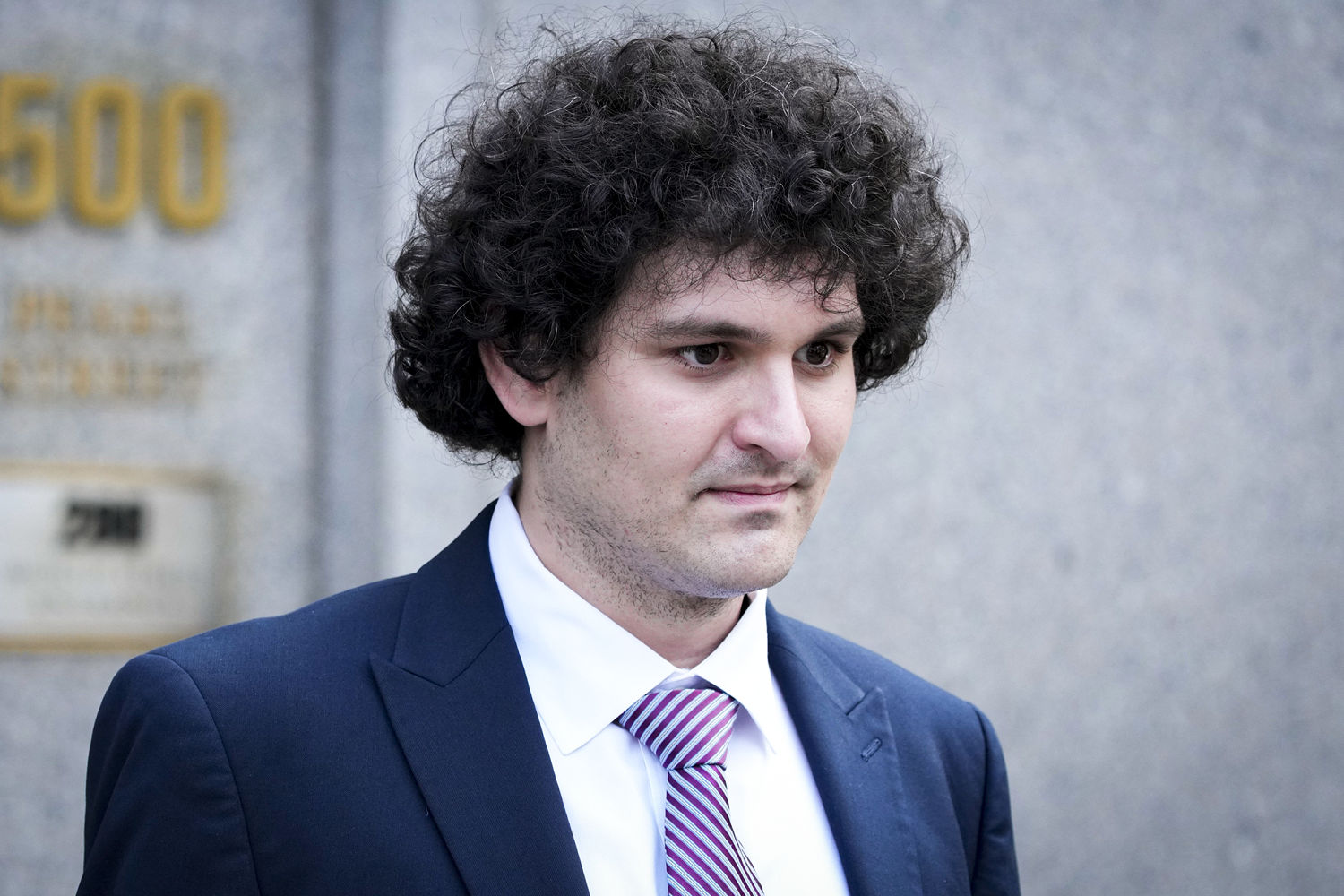
Details emerge about the Baltimore bridge collapse victims as investigations continue. STI rates rise sharply for older adults. And a long-rumored moonshine cave may have been unearthed under a NASCAR track.
Here’s what to know today.
The recovery mission near the site of the collapsed Francis Scott Key Bridge in Baltimore is now a salvage operation, Maryland State Police announced yesterday, after two bodies were recovered.
The mission shifted, police said, because it is no longer safe for divers to operate around the debris and concrete in the port.
Meanwhile, the National Transportation Safety Board shared more details about the vessel that crashed into the bridge. Currently, 23 people — including two pilots and 21 crew members — are aboard the Dali, though it remains stuck in place, the agency said. And there were 56 containers of hazardous materials on board at the time of the crash, some of which were breached. NTSB Chair Jennifer Homendy said she expects an investigation to take one to two years.
This is Morning Rundown, a weekday newsletter to start your morning. Sign up here to get it in your inbox.
The bodies of the victims recovered yesterday were identified as Alejandro Hernandez Fuentes, who was 35, and Dorlian Ronial Castillo Cabrera, who was 26. Police say they were found in a red pickup that was trapped in 25 feet of water.
Four other people are presumed dead, including Miguel Luna and Maynor Suazo, whose loved ones described them as devoted husbands, fathers and workers who were simply trying to improve their lot in life.
“You come to this country to accomplish you dreams, and sometimes that dream doesn’t get fulfilled,” Suazo’s brother, Fredy Suazo, told Noticias Telemundo. “And for a tragedy like this to happen to us, can you imagine?”
Read about the victims here.
A federal judge will decide on a prison sentence for FTX co-founder Sam Bankman-Fried today in New York, four months after a jury found him guilty of orchestrating the multimillion-dollar fraud that prompted the collapse of his cryptocurrency exchange.
Prosecutors are asking for up to 50 years in prison for Bankman-Fried, arguing that the nature of the fraud, his comfortable upbringing and the scale of victims’ losses warrant an aggressive sentence. Bankman-Fried’s attorneys are asking for 6½ years or less. In their plea for leniency, his team cited his mental health struggles, his purported selflessness in his personal life and the safety risks he faces in prison.
But Bankman-Fried’s apparent lack of remorse throughout the trial is likely to weigh heavily on U.S. District Judge Lewis Kaplan, one legal expert said. Here’s why.
Former Sen. Joseph Lieberman, a former Democratic vice presidential nominee who later became an independent, has died after suffering complications from a fall, his family announced. He was 82.
Lieberman was former Vice President Al Gore’s running mate in the 2000 presidential election. In his later years, Lieberman served as the co-chairman of No Labels and referred to by the group as a “moral center” of its movement.
Shortly after Lieberman’s death was announced, former Gore said on X, “It was an honor to stand side-by-side with him on the campaign trail.” Former President George W. Bush, who alongside former Vice President Dick Cheney defeated Gore and Lieberman in 2000, said Lieberman was “one of the most decent people I met during my time in Washington.” The outpouring of sorrow didn’t stop there, with lawmakers from both sides of the aisle paying their respects.
Surging crime levels, out-of-control Democratic cities and “migrant crime” are all familiar Donald Trump talking points as the former president campaigns for another term in office. And he’ll further signal his disapproval as he attends a wake today for New York Police Officer Jonathan Diller, who was killed earlier this week in Queens. On Truth Social, the former president said Diller’s “life was taken by a murderous career criminal.”
But the picture Trump paints contrasts sharply with years of police and government data at both the local and national levels, an NBC News analysis found.
For example, Trump claims that violent crime “skyrocketed in virtually every American city” during Joe Biden’s presidency. In reality, the reported violent crime rate dropped 6% across the board when comparing the last three months of 2022 to the same period in 2023, the FBI reported. The reported drops were especially pronounced in big cities that Trump often assails. Dive further into the numbers.
A United Nations plan drafted by the U.S. and Ecuador calls on Kenyan troops to police Haiti, where months of violence have given way to an unprecedented level of instability and a weekslong leadership void. The plan is in line with the country’s history, marked across generations by foreign intervention. But for now, it’s on hold.
Despite Haiti’s tumult, some residents believe their country will only suffer if foreign intervention is allowed. Others concede that some international support is necessary, but working with foreign actors must be on Haiti’s terms. “Yes, we need to work with different partners; yes we need help; but it is not them who will dictate what kind of help we should get and when we should get it,” said Monique Clesca, who lives in Port-au-Prince. Reporter Char Adams looks back on Haiti’s complicated history and talks to Haitians to understand how the past influences their opinions.
Moonshine has a long history in North Carolina and NASCAR. Many early stars came to the sport after racing illegal moonshine through the rough mountain roads of Appalachia, with one legendary driver first known as a Wilkes County’s most famous bootlegger. Now, there’s another potential connection to add to the list, in the form of a 700-square-foot cave discovered under the grandstands of the legendary North Wilkesboro Speedway. Track officials revealed their recent discovery, which was made after operations staff noticed cracks in the original concrete in Section N. It hasn’t been confirmed that the cave is, in fact, an old moonshine still — but if it is, it would confirm decades-old rumors of its existence.
Sexually transmitted infections are becoming more common in older adults, with rates of chlamydia, gonorrhea and syphilis in people ages 55 and up more than doubling in the U.S. over the 10-year period from 2012 to 2022, according to data from the Centers for Disease ContrAol and Prevention.
A presentation to be delivered today warns that both doctors and older adults are overlooking the risks of STIs in this age group. “We talk about smoking, we talk about diet, exercise, so many things, and not about sex at all,” said Justyna Kowalska, the author of the presentation and a professor of medicine at the Medical University of Warsaw.
There are a few factors that could be behind the spike in STI rates.
Trump ally in trouble: A judge recommended that John Eastman, a co-defendant of Donald Trump in the Georgia election interference case, be disbarred in California.
Congress: A New Jersey representative is planning to propose legislation this week that would prohibit people charged with certain crimes from receiving classified information. The bill implicitly targets embattled Sen. Bob Menendez — but it could also apply to Donald Trump.
2024 election: A rare and highly anticipated gathering of three Democratic presidents — Bill Clinton, Barack Obama and Joe Biden — is expected to generate millions for Biden’s re-election bid. It may also highlight a big vulnerability.
Biden impeachment inquiry: House Oversight Committee Chair James Comer is increasingly suggesting a potential off-ramp from pursuing articles of impeachment against President Biden.
Want more politics news? Sign up for From the Politics Desk to get exclusive reporting and analysis delivered to your inbox every weekday evening. Subscribe here.
I won’t hold you in suspense for long — the answer is global warming. Because of melting polar ice, the concentration of Earth’s mass is changing, and that’s causing the planet to spin less quickly than it would otherwise. Not only was I surprised to learn that humanity’s impact was capable of such change; I also didn’t know that this could affect how we keep time. — Elizabeth Robinson, newsletter editor
Select: Online Shopping, Simplified
An NBC Select reporter — and an avid runner and cyclist — tested over a dozen fitness trackers. Here are his favorites, as well as some expert-recommended picks.
Sign up to The Selection newsletter for exclusive reviews and shopping content from NBC Select.
Thanks for reading today’s Morning Rundown. Today’s newsletter was curated for you by Elizabeth Robinson. If you’re a fan, please send a link to your family and friends. They can sign-up here.
SAN FRANCISCO — It sounds like something out of a James Bond movie: An organization with a vaguely nefarious name and an address in the Cayman Islands sets up offices in dozens of world capitals, where agents dressed in all black use silver orbs to take photos of people’s eyeballs.
But it’s happening in real life, and it’s all voluntary.
Thousands of people a day are having their irises scanned in the far-flung outposts of Worldcoin, a nonprofit foundation that aims to create both a new form of digital identification and a new financial network based on cryptocurrency. Worldcoin was co-founded by Sam Altman, the CEO of OpenAI, the tech startup that’s behind the viral chatbot ChatGPT.
Altman, 38, created Worldcoin in 2019 with two other men, Alex Blania and Max Novendstern, explicitly to try to solve a problem — “proof of personhood” — that OpenAI is arguably inflaming. As artificial intelligence advances, it is becoming far easier to fake a believable human identity through email, voice or video. Custom biometric hardware “might be the only long term viable solution to issue AI-safe proof of personhood verifications,” Worldcoin said in a white paper.
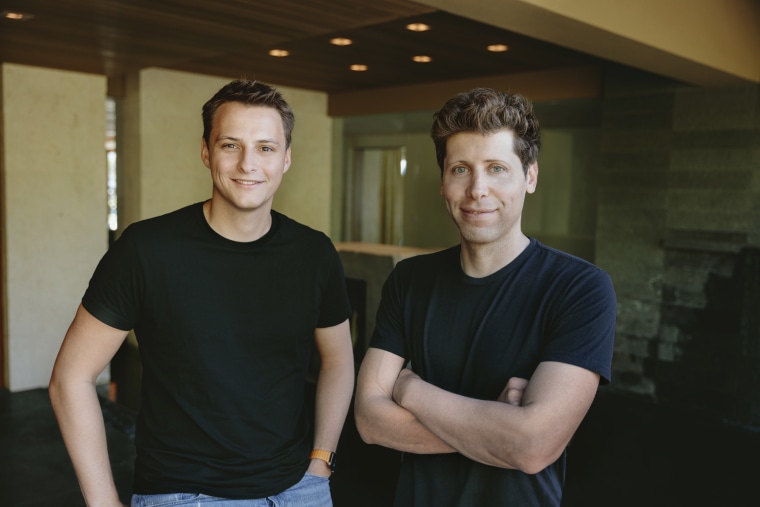
The iris, which controls the color of an eye, is unique to each person. The FBI began collecting images of irises in 2013 to supplement its fingerprint database.
Worldcoin launched a week ago and has made a splash among tech-watchers and internationally.
On Tuesday, I was among the people registering for Worldcoin, visiting a sign-up location in San Francisco to observe the process — and see up close whether the foundation really resembled a spy-world villain.
It’s far from the first time that tech companies have used biometric data to make it easier for people to prove their identity. People use their faces and fingerprints to open smartphones, and the company Clear uses iris scans and other data for entry at airports and sports arenas.
The scale and ambition of Worldcoin, though, are beyond anything tried before. Worldcoin said the scans are happening in 107 places worldwide, from Madrid to Tokyo, from São Paulo to New Delhi.
Worldcoin had a tumultuous trial period, and now is provoking strong reactions including anti-surveillance protests and, in some places, throngs of people wanting to sign up in exchange for free cryptocurrency. A user on the social media app X posted a video of the person appearing to take one of Worldcoin’s silver orbs and toss it into the San Francisco Bay as a protest against dystopia.
But in other cities, people have lined up to have their irises scanned. In Bengaluru, India, so many people showed up that the crowds became disruptive, prompting Worldcoin to close down two locations, the news site Rest of World reported Monday.
Outside the United States, a big part of the attraction seems to be free money. When people get scanned, the foundation gives them cash in the form of a new digital coin named WLD if local regulations allow the cryptocurrency. Early adopters got 25 tokens to start, equal to about $60 as of Tuesday’s exchange rate, with the utopian promise of more tokens in the future “simply for being human.”
The coin, though, is not available in the U.S. because cryptocurrency rules here aren’t clear enough to allow it, Altman and Blania wrote last month.
For people living in the US who still want to sign up without the promise of free money, there are 10 locations in four regions: Los Angeles, Miami, New York and San Francisco.
Sage Wagner, 32, said he signed up in San Francisco because he likes being on the cutting edge of technology and is looking for a permanent solution to identity theft.
“I consider myself a techno-optimist,” he said in an interview. “A digital identity could very much change the world.”
Wagner, a geophysicist at a civil engineering firm, said he had listened to several podcast interviews featuring Altman and came away thinking that he was earnest — or in other words, not a James Bond nemesis.
“He kind of seems to be a good guy, as far as billionaires go,” he said.

So far, Worldcoin’s ID doesn’t have much practical use, but the foundation and its associated for-profit company, Tools for Humanity, are hoping to change that by persuading other companies to integrate its technology. Worldcoin’s website lists eight such partnerships, including with the social media app Discord, to verify users. Imagined future use cases include identity verification for voting, shopping and banking, the foundation says.
Another challenge is privacy regulation. Worldcoin says it’s “completely private” and that it doesn’t store biometric data unless people opt in. “We don’t want to know who you are, just that you are unique,” it says on its website. Still, it’s been getting questions from authorities in France, Germany and Kenya. On Wednesday, the Kenyan Interior Ministry said that it had suspended Worldcoin’s operations as it evaluates the product, according to Reuters.
There’s already a black market for Worldcoin credentials including on Chinese social media and e-commerce apps, with the credentials originating in other countries like Cambodia, CoinDesk reported in May. Worldcoin told the site that there had been a few hundred instances of such activity and that no sensitive data was shared.
On Tuesday, when I visited one of the Worldcoin sites in San Francisco, I saw a mostly empty rented office inside Shack15, a private club catering to tech entrepreneurs on the second floor of a historic ferry-service building built in 1898. Getting an iris scan there required an appointment.
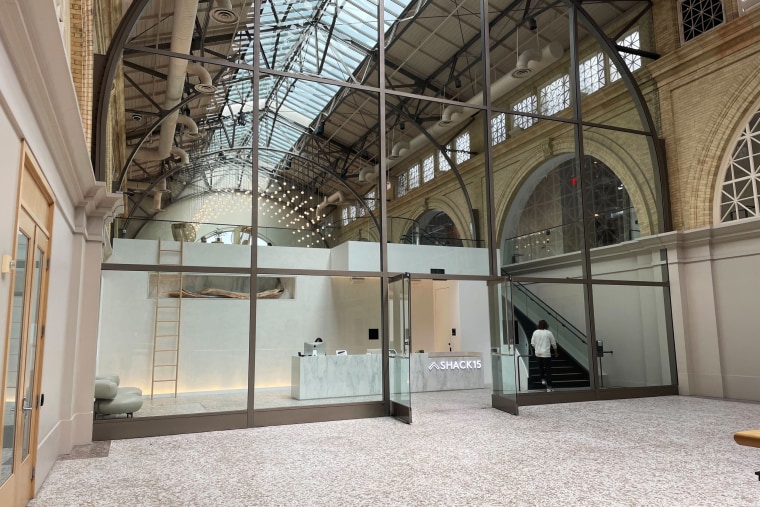
As a visitor, I checked in on an electronic tablet at Shack15’s white marble front desk and then waited on a plush chair for a Worldcoin contract worker, called an “operator.” On the bearded man’s black T-shirt, Worldcoin’s motto was emblazoned: “The global economy belongs to everyone.”
Operating an orb is a form of gig work. Worldcoin’s website describes each orb operator as an independent “local business,” and it says they’re paid to sign people up in their communities, “typically near high-traffic areas like shopping centers and university campuses.”
MIT Technology Review reported last year, during Worldcoin’s pilot phase, that some operators appeared to have used deceptive marketing practices or failed to obtain meaningful informed consent from people before scanning their irises. Blania told the news site that there was some “friction” in sign-ups, which he attributed to inexperience and lack of resources.
My operator in San Francisco guided me up a set of stairs, through the private club’s coffee bar and into a set of offices and conference rooms used by various tech startups. At the end of a hallway, the final office on the left contained a desk, a wastebasket and a television. The room had a name, “Isfjord,” which is also the name of a landform in Greenland.
On the desk: one of Worldcoin’s eyeball-scanning orbs, made in Germany. The orb is silver and reflective. About 8 inches in diameter with a camera inside, it resembled a large Magic 8 Ball or a bowling ball. Like a high-end electric drill, it ran on a removable battery. It felt unexpectedly heavy when I picked it up.
The operator, who asked that his name not be used because he was not authorized to speak for Worldcoin, gave me more information: The orb would take photographs of both my eyes but would not store the images themselves — employing a technology similar to PhotoDNA, a technology that creates a unique digital signature called a “hash” based on an image. The orb would verify that I was a human, based on prior scans of other humans, and that I had not previously been scanned by an orb. (There’s a limit of one digital identity per person.)
Former U.S. intelligence contractor Edward Snowden is among those who have criticized the technology, saying on Twitter in 2021 that Worldcoin would create an “eyeball catalog.”
I went ahead anyway, in part because I’m fairly sure that at least one other corporation has a detailed photo of my iris, and like Wagner, I’m interested in new technology. I haven’t received any WLD tokens, but my orb operator did agree to snap a couple of photos of me.
To start the scanning process, I opened the Worldcoin app on my phone and tapped a button saying, “Verify now: I’m with an Orb.” The next page described the orb’s purpose and how to delete or manage data later on. Yet another page required that I agree to a couple of conditions, including that I was at least 18 years old and that I agreed to the foundation’s terms of service.
Next, the app displayed a QR code with instructions to show the code to the orb. I did, and a small light flashed the orb’s approval.
Then came the moment of truth: I positioned my face about a foot or so from the orb and looked into a circle containing the camera. A couple more lights came on, and the orb beeped. Back on the smartphone app a moment later, a message said to wait a moment.
“Verifying Humanity,” the app said.
